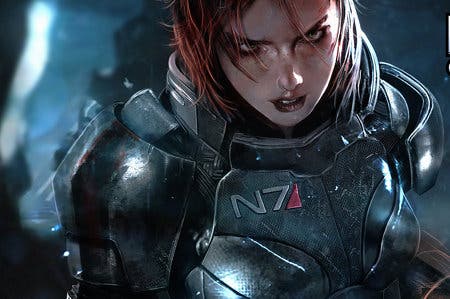Ms. Effect: The Rise of FemShep
Profiling sci-fi's greatest accidental heroine.
Her name is Commander Shepard, though her friends call her anything from Jane to Shiva to Lydia. She's one of the most popular heroines in gaming history; a three-time galaxy saviour who takes no crap and wouldn't be caught dead in a chainmail bikini. To most, she's a long-haired redhead, but she's been seen trying other colours and styles. To some, she's a diplomat, to others, a ruthless, trigger-happy bitch.
And if she didn't already exist, BioWare would never have created her.
It's no secret that BioWare has always considered 'FemShep' (the one and only time I'll be using that ghastly nickname) a mere alternative to Mass Effect's real hero - the grizzled male Commander Shepard seen in all the adverts and on all the game boxes.
They provided one because one was expected, but aside from recording a couple of romance scenes and a few alterered pronouns in conversations, then tweaking some armour designs to give them a bit more space here and here, she was a very half-hearted addition. The female Shepard very obviously uses male motion capture data for instance, which reached its ultimate nadir with the Kasumi DLC for ME2, when she gets a slinky dress to wear, but promptly loses the ability to sit down without putting on a show.
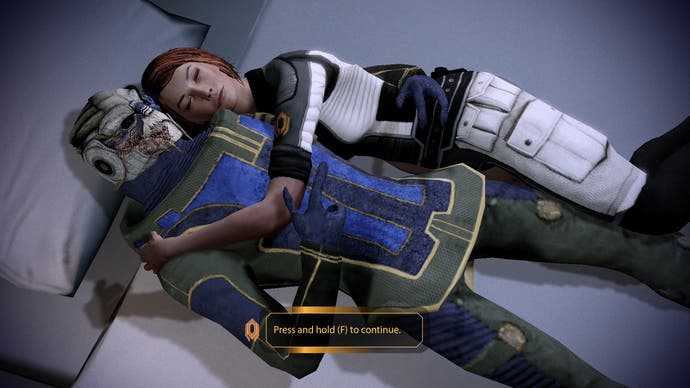
Mass Effect 2 in particular showed off a depressing lack of interest. For instance, when pressed as to why it didn't offer gay relationship options like in Dragon Age 2, BioWare's response was simply that Shepard is heterosexual by design.
That would be perfectly valid... except for the fact that Shepardesses had been able to have a lesbian fling with not only their PA, but no fewer than four yes-they're-female asari babes by that point. Only in the romances was there any suggestion that BioWare saw her as anything other than a man in a woman's body, and it wouldn't be until Mass Effect 3 that both Shepards could bat for either team.
Yet despite these shaky foundations, somehow she works, and she works damn well. She's hands-down the fan-favourite Shepard, even if most players still opt for the male default, and one of the best heroines around. The irony is that much of this feels like it's down to BioWare's apathy. In not particularly trying to create a great female character, they lucked into producing one of the most enjoyable ones around.
There are good reasons for this. Writers (of both genders) often struggle to write good female characters, at least in part because so many of them have been done badly. One of the biggest hang-ups is that 'male' is traditionally treated as as the generic template, with female-ness treated as something extra. Look at cartoon animals. More often than not, the males will simply be shown as funny animals, while the females are identified with bows, dresses and breasts.
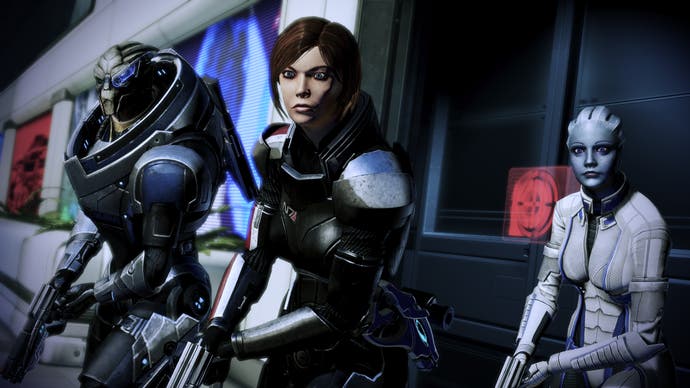
The same applies throughout the English language. The word 'hero' conveys nothing specifically about the subject being a man - and of course, 'heroes' can be a group of either. 'Heroine' on the other hand is explicitly femine. All this leads to the unfortunate, but all-too-common double standard that while a man gets the luxury of being a collection of assorted, variably important traits, a woman is a woman first, and her traits defined through that lens.
At least part of Shepard's appeal is that she doesn't suffer from this. She is a woman, and that plays obvious roles in her relationships and the occasional ill-advised alien quip, but it's her other traits that take centre stage - her strength, her resolve, her commanding presence, and her status as Earth's greatest champion.
Her heroism is direct and active, and refreshingly free of being shoehorned into a direct mothering role like her obvious sci-fi sisters Ellen Ripley and Samus Aran. Her achievements are recognised as the sum of many years of hard work and raw talent, with her gender never treated as a limiting factor. She's not simply the right woman for the job. She's the right human being, full stop.
Would any of this have worked so well without Jennifer Hale breathing life into the character? Possibly, but there's no question that BioWare lucked out by bringing her on board. Divorcing gender from character is no better than obsessing over it - whatever we are, it's a core part of our identities. With a simple pronoun-swapped script, it's very common to end up in what's often referred to as 'man with breasts' syndrome. It's not only writers who bring cultural baggage to their work after all.
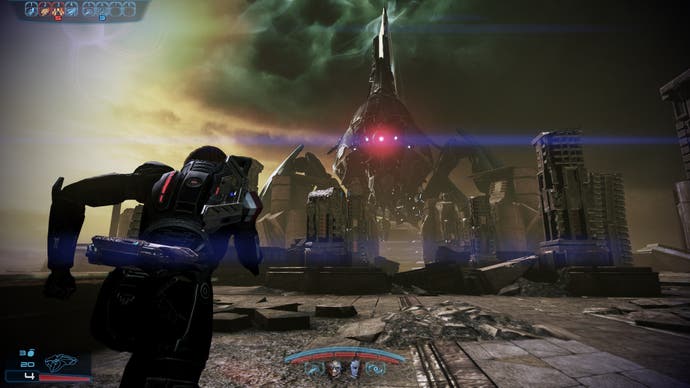
Hale's acting does far more than just give Shepard a female voice. Her performance both grounds her in the Mass Effect universe and adds an emotional core that picks up where the script might have stumbled. You can hear both the smirk as Shepard teases her crew and the knives in her voice when she demands respect from bulletproof lizards twice her size.
She has drive, fears, passion, regrets, high-points, low-points - in short, everything you want from someone in her position, and everything you'd expect from someone with the weight of a whole galaxy on her shoulders. She may not have been written with the idea of creating a Strong Female Character, but that doesn't mean she isn't a strong female character.
So with all this good stuff going on, why is it hard to imagine BioWare and all its in-house talent choosing to create Shepard in her current form? For starters, it's impossible to ignore that when it finally accepted they'd created something special and beloved - a powerful, non-sexualised, mature hero for a modern sci-fi story - its first response was to throw a beauty contest. This already painful face palm gets even more bruising when you factor in that not only had they previously made the rather huffy point that only 18% of players were playing as a female Shepard, simply having that stat suggests they already knew what hair people gave her.
Even if you just write this off as marketing nonsense though, the Mass Effect series' design priorities shine through with a quick glance at the rest of the female cast. Don't get me wrong, I really like most of them. They're fun to spend time with, well-written in their own right, and with great story arcs spanning five years of epic action. Pretty much any other sci-fi game would be lucky to have them.
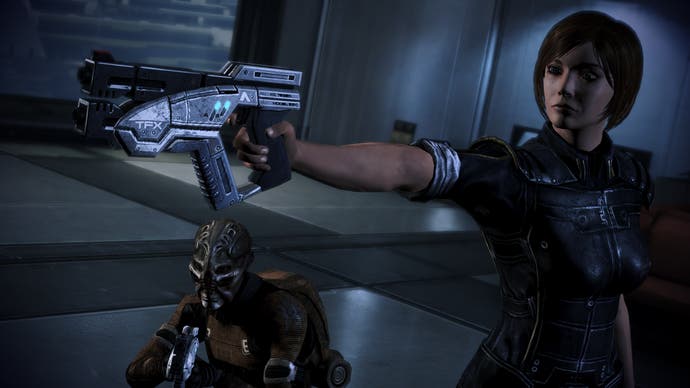
They're not however cut from anything like the same cloth as the default Commander Shepard, which becomes even more noticeable when you compare the male version to the likes of Kaidan, Jacob and Vega. For starters, none of the boys are introduced wearing anything as silly as the bubblegum pink armour we first see Ashley wearing on Eden Prime. Nor are any a counter to the male gaze focused world that leaves 'perfect woman' Miranda spending much of her time giving the camera free arse-shots, EDI ultimately rocking a new 'I Can't Believe It's Not A Sexbot' body, Diana going from embedded reporter to beddable love interest in zero time squared, and the asari... my god, just everything with the asari. They're a species whose Saturday jobs consist of 'stripper' or 'psychic super-commando', and who can't even get a break when turned into Banshees. It's bad enough being zombified by evil Lovecraftian space robots without being sent into unholy battle with super-sized breasts and glowing blue nipple pasties.
This is the school of design a female Shepard would have emerged from, and in fact did. With that loathed beauty contest, we got to see exactly the kind of heroine BioWare would have given the series if it had known anyone was going to care about her. Surprising nobody, it turned out to be someone much younger and thinner, not to mention wearing rather more eye-liner, than the slightly butch, mature, scarred default of Mass Effect 2. She'd have been a perfectly acceptable heroine in many games, but a grizzled war veteran capable of tackling a charging krogan? Charitably, let's just say 'no'.
Still, never mind. It wouldn't have hurt for BioWare to stick closer to the character people made a connection with, just as it'd be appreciated to see both gender options as equal partners in their next RPG, and to be able to hold up their next heroine and say 'That's how you do it!' instead of 'Wow, that turned out surprisingly well, considering.'
What's important though is that however we got Commander Shepard, we got Commander Shepard. By hook or by crook, by accident and design, she's one of the greatest heroines in gaming history. Her adventures may almost be over, but as the end of Mass Effect 3 says, they've already made her a legend. May it live on for many, many years to come.
